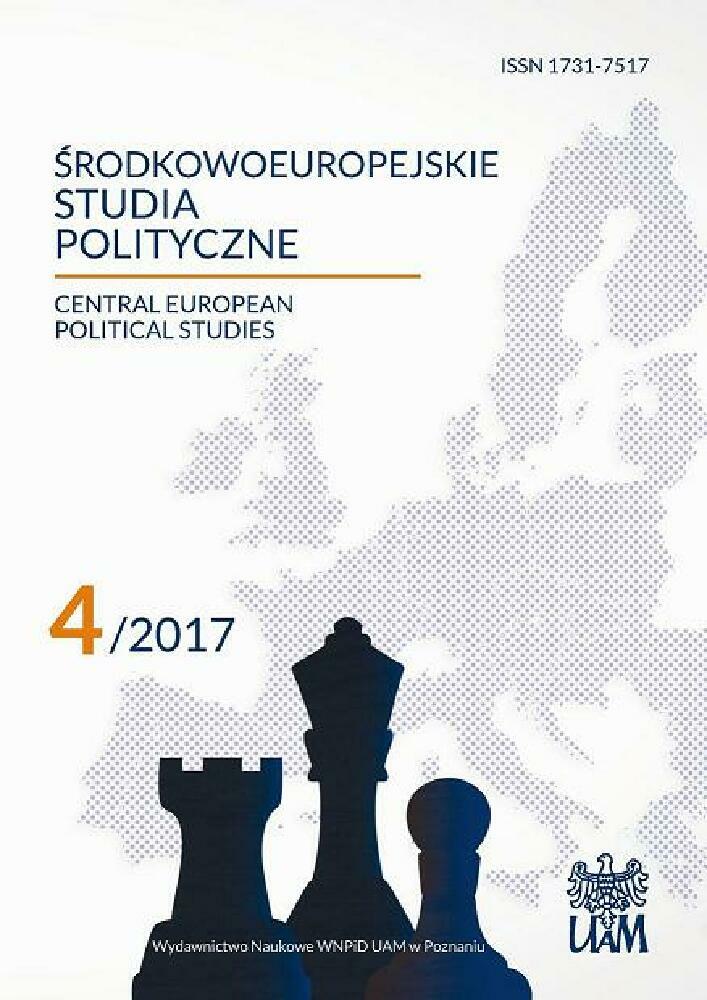Abstract
According to Juan Linz, authoritarian rulers permit limited, powerless political pluralism and organization of elections, but they make it very clear that a change in power is impossible and the opposition cannot take over. Elections in authoritarian regimes are a part of nominally democratic institutions and help rulers to legitimize the regime. They are not free or fair, and therefore do not present any opportunity for the opposition to win and change the political system afterward. The question could be asked, what kind of action the opposition should undertake in order to improve its strength. That is the main problem nowadays for non-systemic opposition in the Russian Federation. On the one hand, the opposition has a problem gaining access to elections, but on the other hand, it knows that even if it could take part, the elections would not be democratic. This article tries to shed light on the strategies of the non-systemic Russian opposition and the possibility of its impact on Russian society when the government tries to marginalize, weaken and eventually destroy the non systemic opposition. The paper provides a critical analysis of the literature and documents on the topic.
References
Bolshakov I. (2012), The Nonsystemic Opposition, Terminological “Error” or Political Reality?, “Russian Politics and Law”, vol. 50, no. 3. DOI: https://doi.org/10.2753/RUP1061-1940500306
Diamond L. (2002), Thinking about Hybrid Regimes, “Journal of Democracy” 13, no. 2 (April), pp. 21–35. DOI: https://doi.org/10.1353/jod.2002.0025
Echo.msk.ru (2012), Общество и власть в условиях политического кризиса, Доклад экспертов ЦСР Комитету гражданских инициатив май 2012 года, 13.05.2016, http://echo.msk.ru/doc/891815-echo.html.
Gelman V. (2005), Political Opposition in Russia: A Dying Species?, “Post-Soviet Affairs”, vol. 21/3. DOI: https://doi.org/10.2747/1060-586X.21.3.226
Gelman V. (2014), The Troubled Rebirth of Political Opposition in Russia, “PONARS Eurasia Policy Memo”, no. 341, September, http://www.ponarseurasia.org/sites/default/files/policy-memos-pdf/Pepm341_Gel’man_September2014.pdf.
Gelman V. (2015), Political Opposition in Russia: A Troubled Transformation, “Europe-Asia Studies”, vol. 67, no. 2. DOI: https://doi.org/10.1080/09668136.2014.1001577
Greene K. F. (2007), Why Dominant Parties Lose, Cambridge University Press, Cambridge. DOI: https://doi.org/10.1017/CBO9780511509803
Greene S. A. (2014), Moscow in Movement. Power and Opposition in Putin’s Russia, Stanford.
Guliyev F. (2012), Measuring Hybrid Regimes: An Alternative Measurement Method and Classification of Post-Soviet Regime, working papaer from 2012, http://www.academia.edu/4968640/Measuring_Hybrid_Regimes. DOI: https://doi.org/10.2139/ssrn.2349169
Hartmann J. (2012), Russland: Einführung in das politische System und Vergleich mit den postsowjetischen Staaten, Häftad. DOI: https://doi.org/10.1007/978-3-658-00175-9
Hirschman A. O. (1970), Exit, Voice, and Loyalty: Response to Decline in Firms, Organizations, and States, Harvard University Press, Cambridge, MA.
Howard M. M., Roessler P. G. (2006), Liberalizing Electoral Outcomes in Competitive Authoritarian Regimes, “American Journal of Political Science”, vol. 50, no. 2. DOI: https://doi.org/10.1111/j.1540-5907.2006.00189.x
Imrussia.com (2015), Marc Plattner: “If Russia Had Become Democratic, the World Would Look Very Different Now”, 11.10.2015, http://imrussia.org/en/analysis/politics/2220-marc-plattner-if-russia-had-become-democratic-the-worldwould-look-verydifferent-now.
Кондратьев В. С. (2012), «Несистемная оппозиция» в России: основные подходы к рассмотрению политического феномена, “Pro Nunc. Современные политические процессы”, Выпуск № 1 (11).
Levitsky S., Way L. A. (2002), The Rise of Competitive Authoritarianism, “Journal of Democracy”, vol. 13(2). DOI: https://doi.org/10.1353/jod.2002.0026
Levitsky S., Way L. A. (2007), Competitive Authoritarianism: The Origins and Evolution of Hybrid Regimes in the Post-Cold War Era, Manuscript, Roessler and Howard 2009, “Post-Cold-War Political Regimes: When Do Elections Matter?”, in: Democratization by Elections: A New Mode of Transition?, ed. S. Lindberg, Johns Hopkins University Press, Baltimore.
Levitsky S., Way L. A. (2010), Competitive Authoritarianism: Hybrid Regimes After the Cold War, Cambridge University Press, New York. DOI: https://doi.org/10.1017/CBO9780511781353
Levada (2013), Несистемная оппозиция: отношение к митингам и лидерам, 14.05.2016, http://www.levada.ru/2013/06/13/nesistemnaya-oppozitsiya-otnoshenie-k-mitingam-i-lideram/.
Linz J. (1978), The Breakdown of Democratic Regimes: Crisis, Breakdown, and Reequilibration, Johns Hopkins University Press, Baltimore, MD. Навальный А. (2014), О выборах. Наша тактика, 11.09.2014, https://navalny.com/p/3803/.
Newsru.com (2016), Эксперты опасаются использования властями РФ Нацгвардии против граждан своей же страны, 13.05.2016, http://newsru.com/russia/06apr2016/nationalguard.html.
Przeworski A. (1991), Democracy and the Market: Political and Economic Reforms in Eastern Europe and Latin America, Cambridge University Press, Cambridge, UK. DOI: https://doi.org/10.1017/CBO9781139172493
Robertson G. B. (2010), The Politics of Protest in Hybrid Regimes: Managing Dissent in Post-Communist Russia, Cambridge. DOI: https://doi.org/10.1017/CBO9780511921209
Ross C., Gelman V. (eds.) (2010), The Politics of Subnational Authoritarianism in Russia, Farnham–Burlington. DOI: https://doi.org/10.2753/RUP1061-1940480201
Sakwa R. (2011), The Crisis of Russian Democracy: The Dual State, Factionalism and the he Medvedev Succession, Cambridge. DOI: https://doi.org/10.1017/CBO9780511779831
Schedler A. (2002), The Menu of Manipulation, „Journal of Democracy”, vol. 2.
Schedler A. (ed.) (2006), Electoral Authoritarianism: The Dynamics of Unfree Competition, Lynne Rienner, Boulder, Colo. DOI: https://doi.org/10.1515/9781685857479
Schedler A. (2009), Sources of Competition under Electoral Authoritarianism, in: Democratization by Elections: A New Mode of Transition?, ed. S. Lindberg, Johns Hopkins University Press, Baltimore.
Shevtsova L. (2012), Putinism under Siege. Implosion, Atrophy or Revolution, “Journal of Democracy”, vol. 23/3. DOI: https://doi.org/10.1353/jod.2012.0040
Słowikowski M. (2010), Rozważania nad naturą reżimu politycznego współczesnej Rosji, in: Rosja. Refleksje o transformacji, eds. S. Bieleń, A. Skrzypek, Warsaw.
Stepan A. (1990), On the Tasks of Democratic Opposition, “Journal of Democracy”, vol. 1, 2. DOI: https://doi.org/10.1353/jod.1990.0021
Швец Д. (2015), Активистка защиты Химкинского леса Чирикова переехала в Эстонию, “Slon.ru”, 18.04.2015, https://slon.ru/posts/50637.
Zimmerman W. (2014), Ruling Russia:Authoritarianism from the Revolution to Putin, Princeton. DOI: https://doi.org/10.1515/9781400850181
License
Copyright (c) 2017 Olga Nadskakuła-Kaczmarczyk

This work is licensed under a Creative Commons Attribution 4.0 International License.
